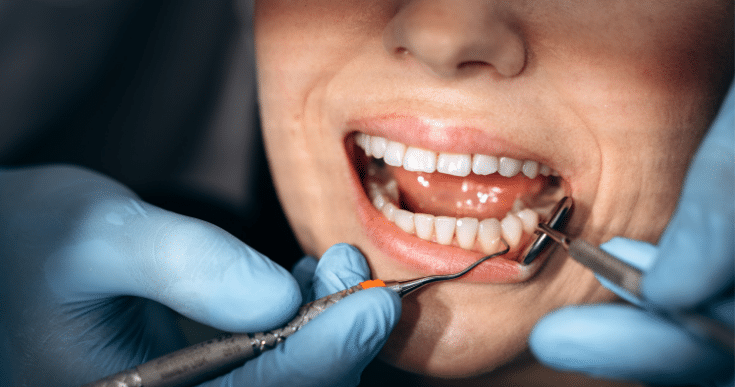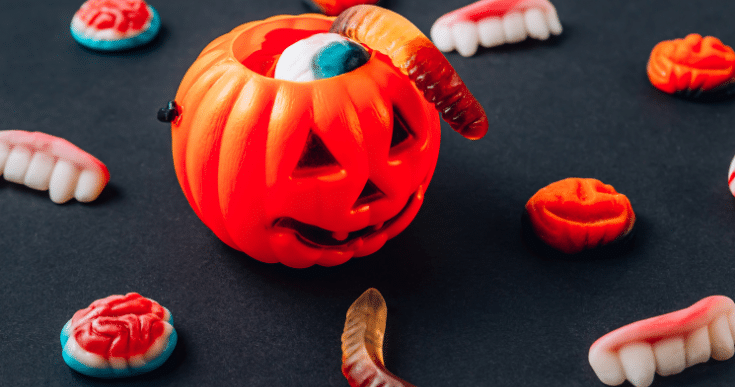
Black spots on your teeth can be startling, leaving you wondering, “What’s lurking beneath the surface?” While often dismissed as mere staining, these dark patches can signal underlying issues beyond just aesthetics. This comprehensive guide delves into the 10 causes of black spots on teeth, offering insights not typically found elsewhere. We’ll explore the science behind each cause, unveil surprising statistics, and empower you with actionable steps to address these concerns. Remember, a healthy smile starts with understanding the “whys” behind its imperfections. So, let’s embark on this journey of oral exploration.
1. Tooth Decay (The Big One)
Black spots often represent the initial stage of tooth decay, a sneaky process where plaque bacteria feast on sugar, releasing acids that erode enamel. This erosion creates microscopic holes, which appear as dark spots.
- Nearly 9 in 10 adults (88.8%) have had at least one cavity in their permanent teeth.
- Untreated cavities can progress to serious infections, costing Americans $110 billion annually.
Early detection and intervention are crucial. Regular dental checkups (twice a year) and proper oral hygiene (brushing twice daily and flossing once) are your defense against this silent enemy.
2. Trauma to the Teeth
Accidents happen, and sometimes a chipped or cracked tooth becomes a breeding ground for black spots. Exposed dentin (the layer beneath enamel) is darker and more susceptible to staining from food and beverages. The prevalence of dental trauma in adults is estimated at 10–30%, highlighting its widespread impact. Promptly seek professional evaluation after any dental trauma. Early intervention can prevent further damage and discoloration.
3. Food, Drinks, and Tobacco’s Mark
Coffee, tea, red wine, and berries—these delicious indulgences come with a price: potential staining. These substances contain chromogens, color pigments that adhere to enamel, creating black spots. Smoking and chewing tobacco further exacerbate the issue, leaving behind nicotine stains. Coffee and tea are the most common culprits, affecting 40–60% of adults. Smoking is a significant risk factor for tooth discoloration, with smokers having twice the odds of experiencing severe staining.
4. Consumption of Dark or Staining Foods and Drinks
Tetracycline, an antibiotic commonly prescribed in childhood, can cause tooth discoloration. It binds to developing teeth, leading to gray or brown spots, sometimes appearing black. This is more prevalent in children under 8 years old. Around 2–7% of children taking tetracycline experience tooth staining. Early intervention with professional cleaning and whitening can improve aesthetics.
5. Fluorosis
While fluoride strengthens teeth, excessive exposure during childhood can lead to fluorosis, a condition characterized by white or brown spots that can sometimes appear black. This is more common in areas with high fluoride levels in the water. Mild fluorosis affects 16–40% of children in the United States. Moderate to severe cases are less common, affecting around 2–8% of children.
If you reside in an area with high fluoride levels, consult your dentist about alternative sources (fluoride toothpaste) and adjust your fluoride intake accordingly.
6: Dental Restorations
Older amalgam fillings (silver fillings) contain mercury, which can leach out over time and cause discoloration of the surrounding tooth structure, appearing as black spots. While less common today, existing amalgam fillings may contribute to these issues. Remember, the timely replacement of old fillings with tooth-colored options can improve aesthetics and oral health.
7. Enamel Hypoplasia
Black spots can sometimes signify deeper problems within the tooth. Pulp necrosis (dead tooth pulp) or internal bleeding can cause discoloration that manifests as black spots on the tooth surface. While less frequent, these situations require prompt dental intervention to address the underlying cause and prevent further complications.
8. Oral Cancer’s Disguises
In rare cases, black spots on the tongue or gums could be an indicator of oral cancer. While unlikely, early detection is crucial for successful treatment. If you notice unusual black spots, particularly those accompanied by pain, bleeding, or persistent mouth sores, schedule an immediate dental checkup.
9. Medical Conditions and Medications
Certain medications, mouthwashes containing chlorhexidine, and iron supplements can cause generalized staining across teeth, potentially appearing as black spots. Consulting your dentist about alternative medications or adjusting oral hygiene practices can help manage these concerns.
10. Poor Oral Hygiene and Plaque Buildup
One of the main causes of black spots on teeth is poor oral hygiene and plaque accumulation. Dental hygiene can be neglected, allowing bacteria to proliferate and create plaque—a sticky film. If this plaque is not consistently removed by using the right brushing and flossing techniques, it may become tartar.
Tartar is an obstinate material that cannot be eliminated by simple brushing. It leaves the teeth with a rough surface, which makes it easy for bacteria to grow and produce acids that erode the enamel. These acidic attacks erode the enamel over time, causing microscopic holes or pits that show up as black spots.
Black spots on teeth, while often harmless, can sometimes signal underlying issues. Early diagnosis and intervention are key. Schedule regular dental checkups with Arcade Dental-Pharr, practice good oral hygiene, and address any concerns promptly. A proactive approach ensures a healthy, confident smile.
A: Tooth decay, staining from food and drinks, and trauma are the leading culprits.
A: Not necessarily. While they can be signs of decay, other factors contribute to discoloration. Consult your dentist for a diagnosis.
A: Proper brushing and flossing, moderation with staining foods, and regular dental checkups are key preventive measures.
A: Treatment depends on the cause. Your dentist may recommend professional cleaning, whitening, or other procedures.
A: Consult your dentist promptly. Early diagnosis and intervention are crucial for their oral health.




